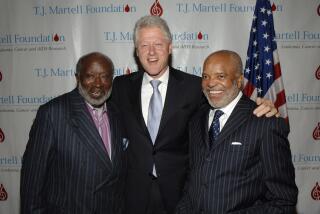A Look at Influence Peddling
- Share via
Michael K. Deaver, in asking for appointment of a special prosecutor to investigate charges against him, has anticipated the inevitable. Even before he spoke, there were indications that the Justice Department was moving in that direction. This is, as Deaver himself acknowledged, “the only way to resolve the issue fairly.”
How much it will resolve remains in doubt. The more fundamental issue cannot easily be legislated: The separating of public service and trust from its abuse and exploitation by those who rush from government jobs to peddle for personal profit whatever influence they may have accumulated while working as a servant of the people.
The law at question in the Deaver case treats only some superficial symptoms of the deeper problem. Under its provisions, former government workers are prohibited from lobbying for two years in areas for which they were responsible in their last year in office. The Senate Judiciary Committee is conducting hearings today to see if tighter rules are required.
The Deaver matter already has revealed an insensitivity on the parts of both Deaver and President Reagan regarding the distinction between public responsibility and the exploitation for personal profit of “connections.” The President said on Friday that it was “ridiculous” to think of naming a special investigator, demonstrating once again his confidence in Deaver, the same confidence that already had encouraged him to permit his former deputy chief of staff to keep his White House pass and to receive the highly restricted private schedule of the President’s daily activities. With obvious emotion, the President had described “Mike’s” departure a year ago as an “amputation.” That now seems at best an exaggeration.
Sleaze is best discouraged by the example of people of integrity and principle who demonstrate their commitment to the public interest as a responsibility, not a steppingstone to lucrative service to special interests.
There are some, if imperfect, legislative restrictions that can be imposed on influence peddling. Some progress has been made in restraining the machinations of military procurement officers moving into the ranks of defense industries with which they had dealt on behalf of the Pentagon. The law that Deaver is suspected of violating is a useful restraint and should be scrupulously applied, which is why the appointment of a special prosecutor is appropriate. But the difficulty of the task is evident in the enormous sums of money that special interest groups are prepared to pay anyone perceived to have influence, particularly influence at the center of power, the White House.
More to Read
Get the L.A. Times Politics newsletter
Deeply reported insights into legislation, politics and policy from Sacramento, Washington and beyond. In your inbox twice per week.
You may occasionally receive promotional content from the Los Angeles Times.








